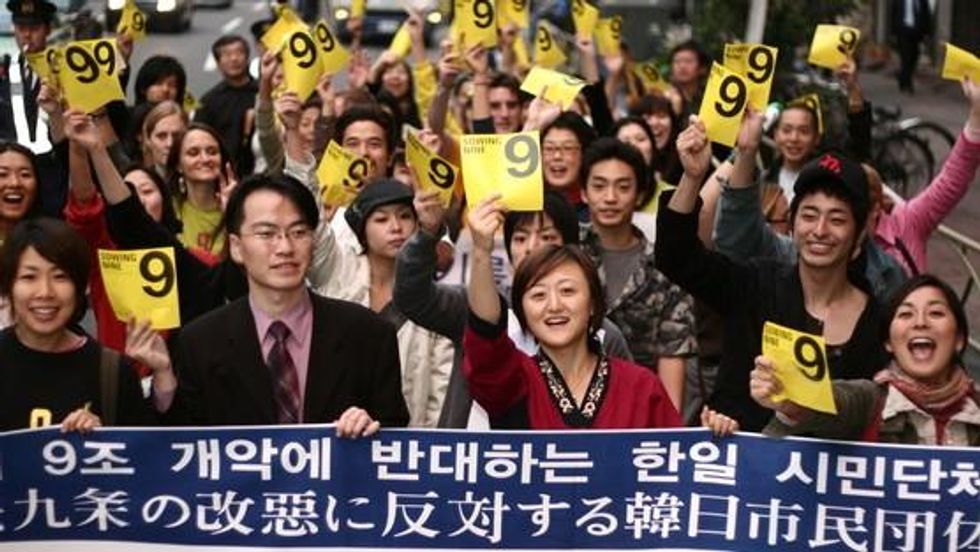The government of Japan is seeking to abolish Japan's long-standing peace clause, which has served as a "regional and international peace mechanism," in favor of bolstering the country's military and opening its doors to the international arms trade.
Following a vote Sunday when Prime Minister Shinzo Abe's ruling Liberal Democratic Party gained the largest portion of Upper House seats, Japan Times reports that one of the prime minister's initial goals will be to revise the constitution "so it only requires a simple majority of 51 percent" before an amendment is put to a national referendum, rather than the standing two-thirds majority.
With this power, he would then be able to alter the war-renouncing peace clause, Article 9, "with a simple coin flip vote."
Saying that it "isn't a secret for anybody," Akira Kawasaki and Celine Nahory of the Tokyo-based NGO Peace Boat note that it has always been one of the top priorities of the leading political parties, particularly the Liberal Democratic Party, to amend the constitution in favor of allowing Japan to exercise "collective military action."
Article 9 of the constitution "is the famous peace clause, which renounces war as a means of settling international disputes and prohibits the maintenance of armed forces and other war potential," they explain. "It's not only a provision of the Japanese law. It also acts as a regional and international peace mechanism that has served as the foundation for collective security for the entire Asia Pacific region."
They continue:
Abe is determined to push his agenda forward. One of his first moves has been to order the bolstering of the country's military and announce an increase of 40 billion yen ($440 million) in defense spending - the first increase in 11 years. He has also made clear that he intends to revise defense guidelines with the US, which would like to incorporate Japan's SDF into the its global military strategy, and turn Japan's Self-Defense Force (SDF) into a full-fledged national army.
Further, according to an official source speaking to Japan Times Monday, the prime minister is in the "process of reviewing" the 1967 arms embargo enacted following the Cold War, saying it is "out of sync with the global trend toward sharing technologies and jointly developing weapons."
Japan Times continues:
The Defense Ministry is expected to include the plan to create new guidelines in its midterm report on the new defense program that Tokyo is to compile by year's end. The report could be released as soon as Friday.
Now in a stronger position after Sunday's Upper House election, the prime minister apparently intends to focus more on security issues and his long-held goal of revising the Constitution.
Abe also believes it would be wise to set new guidelines regarding the development and trade in arms, rather than making exceptions case by case, the source said.
Since taking effect, the voluntary embargo--which prohibits the export of weapons to communist states, countries subject to arms embargoes under UN resolutions, and countries involved in international conflicts--has had a few notable exceptions.
In 2004, Tokyo was allowed to "cooperate with the US" in developing an anti-ballistic missile defense system and after Abe took power last December his government has allowed Japanese companies to jointly produce parts for the US F-35 fighter jet.
Japan's peace community has initiated an international petition calling on Prime Minister Abe not to amend the country's peace clause, encouraging governments to instead work towards "disarmament, demilitarization and a culture of peace."
_____________________

